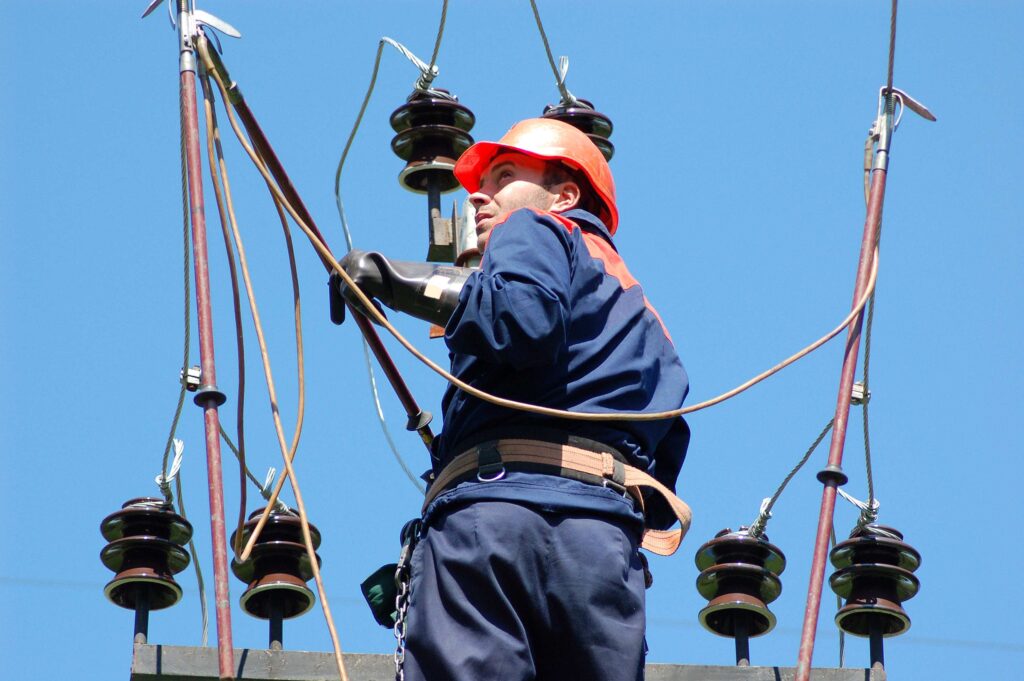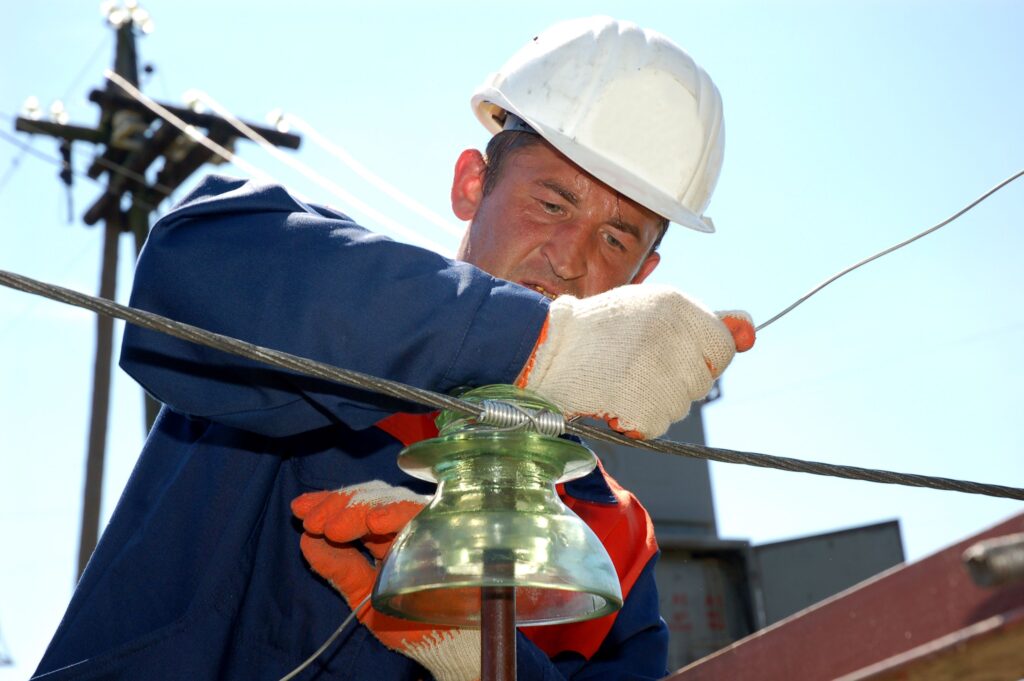Lineman wages vary by region, job experience, and employer type. On average, linemen earn around $30 to $40 per hour.
The profession of a lineman is both demanding and rewarding, with salaries reflecting the technical skills and risks involved. These tradesmen specialize in the installation and maintenance of electrical power systems, a critical service that demands a high level of expertise.
Consequently, linemen are typically well-compensated for their specialization in this field. Entry-level positions often start with competitive pay, and as linemen gain experience and possibly acquire additional certifications or specializations, their earning potential increases. Union membership can also influence wages, as can overtime opportunities during emergencies or natural disaster recoveries. Understanding the factors affecting lineman wages can aid those considering this career path in setting realistic job prospects and salary expectations.
The Importance Of Linemen
Linemen play an essential part in our daily lives, often unnoticed. These skilled professionals are the backbone of our electrical infrastructure. Their hard work ensures our homes stay lit and our businesses keep running. Their wages reflect the critical nature of their responsibilities and the risks they take every day.
The Vital Role Of Linemen
Electric power is the lifeblood of modern society. Everything we do, from checking an email to keeping food fresh, depends on it. Linemen make this possible. They construct and maintain the network of wires and cables that distribute electricity.
- Install power lines
- Maintain electrical infrastructure
- Respond to outages
- Work in challenging conditions
Their skills keep the lights on for millions of people every day.
Safeguarding The Power Grid
Power grids are complex systems. They transport electricity from power plants to consumers. Linemen are guardians of this system. They work tirelessly to prevent outages and restore power when disasters strike. Safety and reliability are their top priorities.
Their tasks include:
- Monitoring the grid’s health
- Upgrading old equipment
- Clearing hazards from lines
- Fixing damaged components
Linemen’s knowledge and swift actions can avert major power disruptions.

Factors Affecting Lineman Wages
Linemen are the unsung heroes who ensure our homes and businesses have power. Their wages can vary widely. Several factors play a role in determining how much a lineman earns. Understanding these can help aspiring linemen set career goals.
Level Of Experience
Experience significantly impacts a lineman’s paycheck. Beginners often start with lower wages. As they gain years on the job, their salary tends to grow. The table below showcases typical wage progression:
| Years of Experience | Wage Range |
|---|---|
| 0-1 Year | $20 – $25/hr |
| 1-4 Years | $25 – $30/hr |
| 5-9 Years | $30 – $40/hr |
| 10+ Years | $40+/hr |
Specialized Skills And Certifications
Special skills mean higher pay. Linemen with advanced certifications tend to earn more. Below are some key skills that can boost wages:
- High Voltage Systems
- Emergency Response
- Renewable Energy Integration
Certifications such as the Electrical Lineman Certification can also lead to better pay.
Geographical Location
Location affects wages. Urban areas often offer higher pay than rural regions. Cost of living plays a role. Some states need more linemen and may offer higher wages to attract talent.
Public Vs. Private Sector
Employment sector influences earnings. Public sector jobs might offer benefits like pensions. Private sector roles might offer higher salaries. The choice affects long-term income. Below are some contrasts:
- Public Sector: Stable hours, retirement benefits
- Private Sector: Potential for overtime, flexible contracts
Average Lineman Wages
Exploring the average lineman wages offers intriguing insights into the earnings of these skilled professionals. Linemen play a critical role in maintaining and repairing electrical power systems. Their compensation often reflects the demanding nature of their job. In this post, we’ll delve into the financial rewards that linemen receive for their high-risk, highly skilled work.
National Average WageNational Average Wage
According to the Bureau of Labor Statistics (BLS), the national average annual salary for electrical power-line installers and repairers is approximately $65,000. This figure indicates a robust earning potential for those in the lineman field.
Regional VariationsRegional Variations
Wage variances across different regions underscore the importance of location in a lineman’s earnings. Factors contributing to these variations include the cost of living, demand for linemen, and state-specific energy infrastructure needs.
- High-cost areas may offer higher pay
- Rural regions sometimes provide competitive wages due to fewer available workers
Top Paying States
Some states are known for more lucrative lineman wages. The top paying states typically have advanced energy sectors and higher costs of living. These states often feature more demanding work environments.
| State | Average Salary |
|---|---|
| California | $100,000+ |
| Oregon | $90,000+ |
| Washington | $90,000+ |
| Alaska | $90,000+ |
| New Jersey | $80,000+ |
Comparison To Other Industries
When comparing lineman wages to other industries, it’s clear that linemen often earn more than average. Their specialized skill set and the hazardous nature of their job command a premium against other trades.
- Linemen usually outearn general construction labor
- Their wages often surpass those within other utility services
- Advanced experience and certifications can lead to further wage increases
Bonus And Overtime Pay
Understanding bonus and overtime pay is crucial for linemen. These extra earnings can significantly boost their overall income. A lineman’s base salary is only part of the story. Bonuses and overtime can make a big difference in their paychecks.
Importance Of Bonuses And Overtime
In the life of a lineman, the importance of bonuses and overtime cannot be overstated. These financial additions reward hard work and long hours. They also reflect the hazardous and demanding nature of the work.
Impact On Lineman Wages
Extra earnings from bonuses and overtime can lead to a substantial increase in a lineman’s wages. This impact is not just about immediate gains. It can also affect retirement plans and overall job satisfaction.
Common Bonus Structures
- Performance-related bonuses: Reward for exceeding targets
- Signing bonuses: Incentive for joining a company
- Hazard pay: Extra for working under dangerous conditions
- End-of-year bonuses: Share of company profits
Overtime Rates And Regulations
Overtime is governed by state and federal laws. Normally, linemen receive time and a half for overtime hours. This means 1.5 times their standard hourly rate. Some factors that affect overtime include:
| Factor | Details |
|---|---|
| Hours Worked | Over 40 in a workweek |
| Rate | Increased after standard hours |
| Regulations | Varies by state |
Career Advancement Opportunities
Stepping into the lineman field unlocks various paths for growth. Ambitious lineworkers can climb the ladder. They can reach new heights in their careers. This means better titles, responsibilities, and, crucially, wages. Let’s explore how this journey unfolds.
Path To Journeyman Lineman
A lineman’s journey begins as an apprentice. Here, they learn the ropes under experts. Next, they accumulate on-the-job experience. After certain hours and skills tests, they emerge as journeymen. Journeymen wield deeper knowledge and command higher pay.
Supervisor And Management Roles
For those aiming higher, supervisor and management roles await. Experienced workers can oversee projects. They can guide teams. Moving up to manager, one can strategize operations. These roles bring prestige and an increased salary.
Salary Growth With Advancement
With each step up the career ladder, wages grow. Use tables to track potential salary ranges. A clear-cut advantage of climbing ranks is the visible wage increase. From apprentice to management, the pay scale reflects growing expertise and responsibility.
| Position | Experience | Salary Range |
|---|---|---|
| Apprentice Lineman | 0-3 years | $30k-$50k |
| Journeyman Lineman | 3+ years | $50k-$80k |
| Supervisor/Manager | Varies | $80k+ |
Training And Education Requirements
Education is key in this field. Begin with a high school diploma. Adding a technical certificate can be beneficial. Then, complete an apprenticeship. For management, consider additional courses. Persevere, and continuous learning pays off in promotions and increased income.
Job Outlook And Demand
Electricity is essential to our daily lives. Linemen play a crucial role in maintaining and enhancing power systems. The job market reflects a high demand for these skilled professionals. Let’s delve into the job outlook and demand for linemen.
Increasing Need For Linemen
Linemen are more important than ever. Cities grow fast, and so does the need for reliable electricity. This growth means more jobs for linemen.
- Population increases demand energy.
- Old infrastructure requires updates.
- Storms and natural disasters call for urgent repairs.
Factors Driving Demand
Several key factors spike linemen’s demand. Not just population growth, but also green energy initiatives, and the retirement of seasoned linemen create more openings.
| Factor | Impact |
|---|---|
| Renewable Energy Projects | Need for grid integration |
| Technology Upgrades | Smart grid development |
| Infrastructure Aging | Constant maintenance |
Future Job Prospects
The future looks bright for aspiring linemen. Job security seems promised with ongoing needs.
- Utility companies list many open positions.
- Job growth is faster than average.
- Skills shortage means more opportunities.
Impact Of Technological Advancements
Technology shapes lineman jobs. Tools improve, and safety enhances. New systems like smart grids require specialized knowledge. Training programs are evolving to keep pace with these changes.
Example technologies: drones for line inspection, AI for grid management.Challenges And Rewards Of The Job
Exploring a career as a lineman comes with its fair share of obstacles and windfalls. The balance of high-stakes challenges and the personal growth and satisfaction drawn from the job can be a compelling mix. Let’s delve into what sets this career apart.
Physical Demands And Hazards
Being a lineman is not for the faint-hearted. It demands top-notch physical conditioning and a steadfast commitment to safety. Daily tasks involve:
- Climbing poles and towers
- Lifting heavy equipment
- Braving extreme weather
Safety is paramount, due to risks such as:
- High voltage exposure
- Working at heights
- Potential for falls and electrical accidents
Career Satisfaction And Fulfillment
Despite the inherent challenges, many linemen report high job satisfaction levels. Key factors include:
- Competitive wages
- Robust benefits packages
- Opportunities for advancement and skill development
The sense of pride in keeping communities powered is a unique reward.
Importance Of Teamwork
Teamwork is the backbone of a lineman’s success. Crews rely on seamless collaboration to:
- Ensure task efficiency
- Maintain safety standards
- Provide mutual support
The comradery among linemen often extends beyond the job, fostering deep bonds.
Community Appreciation
Linemen are unsung heroes in their communities. Their rigorous work:
- Restores power during outages
- Keeps essential services running
- Commands public gratitude
Community respect and appreciation further increase job gratification.
Tips For Pursuing A Lineman Career
The path to a fulfilling lineman career brims with promise and competitive wages. Here’s how you can jumpstart your journey:
Developing Technical Skills
Master the fundamentals. Focus on electrical systems and power distribution. Tackle courses in math and science. They sharpen problem-solving abilities. Earn certifications. They prove your expertise to employers.
Gaining Relevant Experience
- Start early: Look for internships even while studying.
- Fieldwork counts: Volunteer or work in related fields.
- Show initiative: Small projects hone practical skills.
Networking And Apprenticeships
Connect with professionals. Use platforms like LinkedIn. Join lineman forums. Discuss trends and tips with peers. Apply for apprenticeships. This is a paid opportunity to learn on the job.
Continuing Education Opportunities
Attend workshops. They keep your knowledge fresh. Pursue advanced training. This opens doors to higher positions. Stay updated on technology. It’s crucial in our rapidly evolving field.

Frequently Asked Questions For Lineman Wages
What Is The Highest Paid Type Of Lineman?
The highest-paid type of lineman is typically an outside lineman or electrical power-line installer, often working in high-voltage environments with significant overtime and hazardous conditions.
Do Lineman Make 6 Figures?
Some linemen can make six figures, especially those with extensive experience, overtime work, or in certain high-paying regions or industries.
What Do Lineman Get Paid In Texas?
Linemen in Texas typically earn between $35,000 to $99,000 annually. Experience, location, and employer size can influence salaries.
How Much Do Entry Level Apprentice Lineman Make In Texas?
Entry-level apprentice linemen in Texas typically earn between $30,000 and $40,000 annually. Their compensation aligns with industry standards and regional cost of living.
Conclusion
To summarize, lineman salaries reflect the demanding nature of the job and the requisite skill set. Competitive wages honor the dedication and risk these critical service providers undertake daily. Exploring factors influencing income ensures a comprehensive view of lineman earnings.
Recognizing their worth remains essential for a robust power infrastructure.

